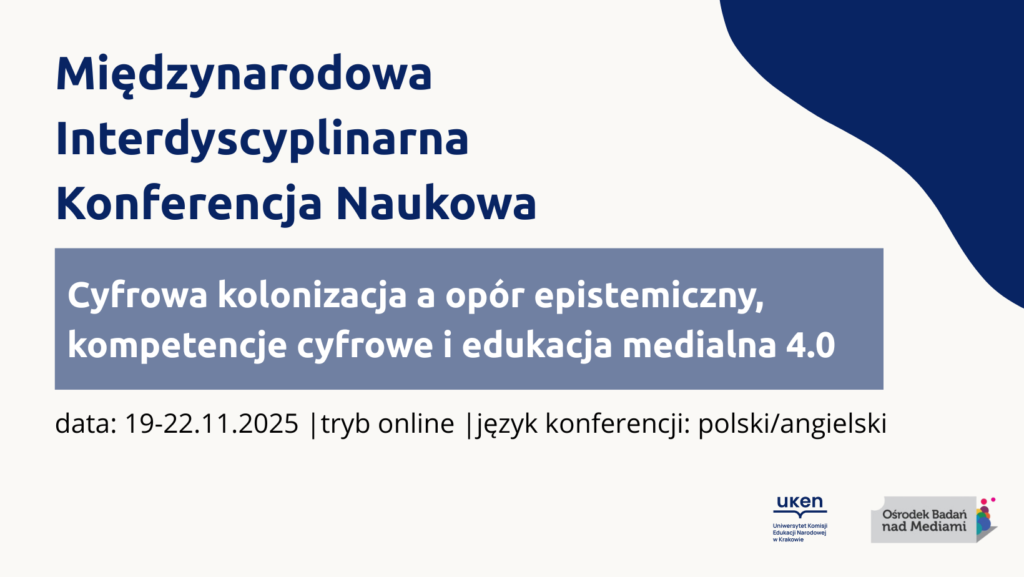Digital Colonization and Epistemic Resistance, Digital Competences, and Media Education 4.0 – Scientific Conference

The International Interdisciplinary Academic Conference titled Digital Colonization and Epistemic Resistance, Digital Competence, and Media Education 4.0 will be held online from 19 to 22 November 2025. The event is organized by the Media Research Centre at the Institute of Polish Philology, University of the Commission of National Education in Kraków. Applications are accepted until November 9, 2025.
International Interdisciplinary Scientific Conference
Conference Theme: Digital Colonization and Epistemic Resistance, Digital Competences, and Media Education 4.0
Organizer: Media Research Center, Institute of Polish Philology (IFP)
Commission of National Education University in Kraków
Conference format: Online
Date: November 19–22, 2025
Conference languages: Polish / English
Conference Description:
In the 21st century, we witness a new form of colonization—not conducted by armies, but through code, data, and algorithms. Digital power today is global, invisible, and deeply embedded in the architecture of everyday life. Data is extracted like raw materials; algorithms—like “imperial officials”—decide our choices, visibility, and opportunities.
The conference “Digital Colonization and Epistemic Resistance, Digital Competences, and Media Education 4.0” is organized as a form of intellectual resistance against hegemonic cultural, technological, and economic narratives. It aims to explore and reformulate the ways technology shapes knowledge, power, and social relations
We ask:
- Is data decolonization and sovereign digital infrastructure possible?
- How can we recognize mechanisms of algorithmic hegemony and their epistemic effects?
- How can we educate new generations of users who are not only technically proficient but also critical, aware, and resistant?
Our response is Media Education 4.0—not only teaching how technology works but above all why it works this way, whose logic it supports, what future it serves, and whose voices it excludes.
This conference, in line with the organizers’ intentions, aims to bring together academic, technological, and activist communities. It creates a space for transdisciplinary and interinstitutional dialogue where education, art, science, and politics meet to design alternatives that are more just, inclusive, and based on shared responsibility for data.
Digital colonization is a contemporary form of hegemony where data—as the key resource of the information age—is captured, processed, and exploited in ways reminiscent of historical colonial logic. States and communities of the Global South, as well as marginalized groups within Global North societies, become “raw material providers” of data extracted by dominant technological actors (digital platforms, states, corporations), processed non-transparently, and monetized within platform capitalism and surveillance systems.
The theoretical inspiration for the conference includes seminal works in data and technology critique: The Costs of Connection (Couldry & Mejias, 2019), which introduces “data colonialism” describing the structural subjugation of data and technology to exploitative logic; The Age of Surveillance Capitalism (Zuboff, 2019), presenting surveillance capitalism as a new economic order; and Algorithmic Colonization of Africa (Birhane, 2020), illustrating how AI systems reproduce neocolonial global relations.
In this context, data are no longer merely an information infrastructure component—they become tools of epistemic, economic, and political power. Classification algorithms, predictive models, cloud infrastructure, and surveillance systems all operate based on globally uneven data flows, reinforcing digital hierarchies.
Critical thinking and media-digital competences as a form of resistance
A key dimension of counteracting digital colonization is developing critical competences that enable users, citizens, and institutions to analyze how digital technologies operate and reflect on their social, cultural, and political consequences. Critical thinking is understood not only as information analysis skills but also as a civic practice grounded in ethics of responsibility for shared digital and informational resources.
Equally important are media and digital competences, including:
- Recognizing data extraction and behavioral modeling mechanisms,
- Decoding the algorithmic logic of platforms,
- Awareness of risks linked to data infrastructure concentration,
- Ability to use alternative tools and models (e.g., data commons, free software, local infrastructures),
- Participation in civic initiatives for digital sovereignty.
Lack of these competences leads to automated consent to exploitation—both individually and systemically—reinforcing technological power asymmetries and distancing us from real participation in digital life.
Conference Topics:
- The concept of digital colonization and data as a new colonial resource
- Data infrastructure and power asymmetry
- Platform capitalism and data extraction
- Media Education 4.0 as a tool of epistemic resistance in the era of digital colonization
- Digital competences and informational sovereignty: media education in the age of Technology 4.0
- New challenges for Media Education 4.0—from disinformation to algorithmic manipulation
- Technologies 4.0 serving media education—tools and strategies for educating aware media users
- Media Education 4.0 and digital inclusivity—combating informational and educational exclusion
- Shaping critical attitudes toward digital hegemony—the role of Media Education 4.0
- Algorithmic domination and reproduction of inequalities: challenges for democracy and critical social sciences
- Digital sovereignty and resistance
- Postcolonial critique of technology
Submission deadline: November 9, 2025
Submit via: https://forms.gle/MDN1hV2oHYSejM64A
Organizers will inform applicants about acceptance by November 14, 2025.
Contact email: konferencja.cyfrowakolonizacja@gmail.com
Participation in the conference is free of charge.
You are warmly invited to participate!
 Badania Media
Badania Media